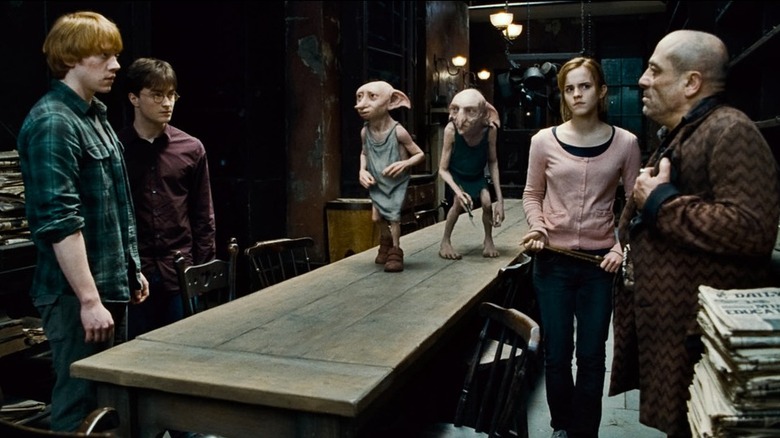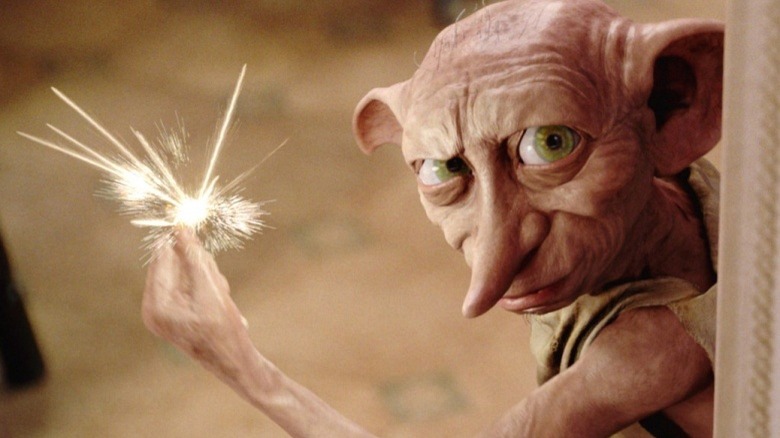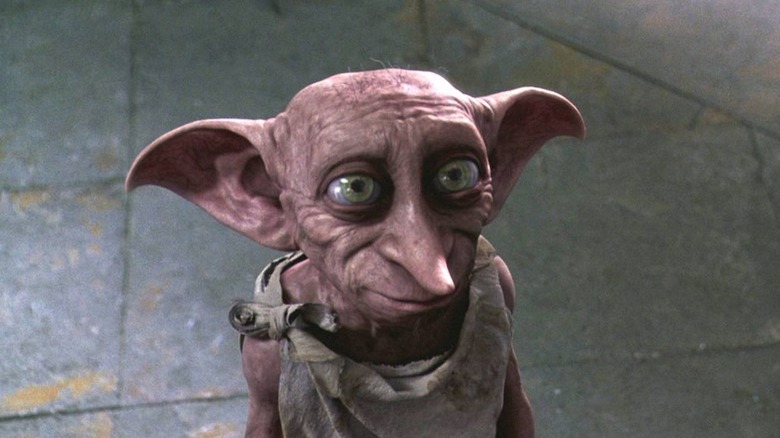How The Harry Potter Reboot Could Expand The House-Elves' Story
Adapting the "Harry Potter" books — written by Joanne Kathleen Rowling — was a huge undertaking, and considering that some of the books are several hundred pages long, it makes perfect sense that some plot elements ultimately hit the cutting room floor. A great example is Peeves, the resident poltergeist at Hogwarts School of Witchcraft and Wizardry, is cut from the movies entirely, though the late British comedian Rik Mayall did film a few scenes for the first film. Small moments ended up left out of the movies — but now, with a new "Harry Potter" series on the way, that might be remedied.
During a press event centered on the merger between HBO and Discovery+, it was announced that a decade-long "Harry Potter" series will come to Max, the rebranded version of streamer HBO Max. The series will feature an entirely new cast and, presumably, have enough room to feature every little detail of the book, from Mrs. Weasley's yearly Christmas sweaters to every aspect of Voldemort's backstory. This could also mean the house-elves, a magical race within the wizarding world, could get more attention — which has its perks and its drawbacks.
Adding the house-elves back into Harry Potter would flesh out the world
Certainly, adding the house-elves back into the "Harry Potter" cinematic universe would definitely round out the world, especially because other creatures like giants and goblins got so much play in the original films. If you're unfamiliar with house-elves, let's get you up to speed. Introduced in the second book and film, "Harry Potter and the Chamber of Secrets," house-elves are owned by some of the wizarding world's wealthiest and most established families (typically pureblood ones), and Harry meets his first one when Dobby shows up at his Muggle relatives' house, warning him not to return to Hogwarts in the fall.
Dobby, once freed, becomes a friend and ally to Harry throughout the books, and he also meets Winky — a loyal house-elf to a Ministry official who is dismissed in disgrace — and Kreacher, who belongs to Harry's godfather Sirius Black. After Sirius dies, he leaves his house, along with Kreacher, to Harry, and to say the two don't get along at first is an understatement. Moreso in the book than the movie, however, Kreacher has a turning point in "Deathly Hallows," where, when Harry shows him affection, he becomes a loyal and fierce servant.
There's a huge problem with bringing house-elves back to Harry Potter, though
Read all that stuff over again, carefully. If you're wondering if house-elves get paid or receive any compensation for their servitude, the answer is a resounding no. House-elves are slaves who can only be freed if they're given a legitimate article of clothing; most of them wear tea-towels or similar pieces of cloth twisted into make-shift togas, according to the books.
Worst of all, the common argument in the books is that not only is this okay, the house-elves really love it. Hermione, upon finding out that all of Hogwarts is run by house-elves who aren't paid for their work, is incensed and tries to start S.P.E.W., or "The Society for the Promotion of Elfish Welfare." Does anyone help her in her mission to end wizarding slavery? Quite the opposite; her friends endlessly mock her, and older wizards tell her that house-elves like being indentured servants. Dobby, the only elf to enjoy freedom (and even his enjoyment has limits, as he turns down higher pay and more vacation days), is regarded as a freak, whereas Winky ends up developing a drinking problem after receiving clothing and is completely miserable. Kreacher is viewed as just plain evil until he starts cooking for the main trio.
Bringing house-elves back would be true to the books. It's also a pretty tricky subject. Whether or not they tackle this remains to be seen, but the original movies, which are streaming on HBO Max now, basically skate over the whole thing.


